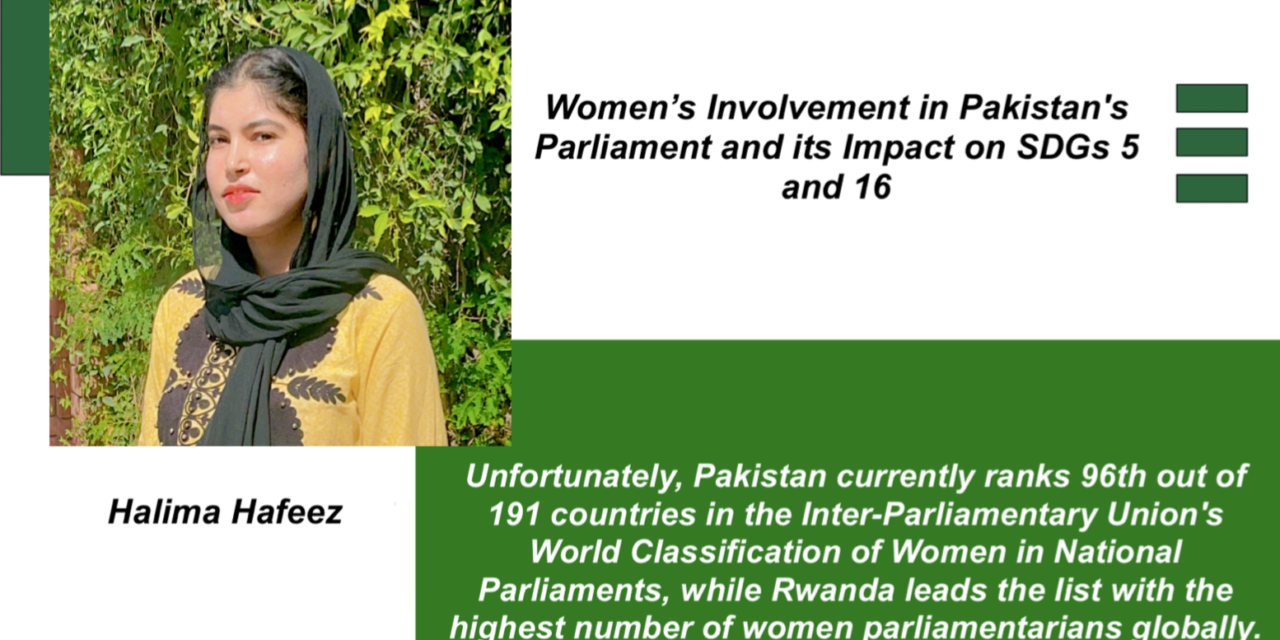The Sustainable Development Goals 5 and 16 are critical to achieving gender equality and inclusive institutions. Sadly, Pakistan ranks among the worst-performing countries in terms of women’s political empowerment and leadership, with a low number of women holding managerial positions. Compared to Bangladesh and Sri Lanka, Pakistan has only closed 55% of its gender gap, highlighting the urgent need for increased representation of women in political decision-making processes.
Achieving gender equality is not only important for creating inclusive institutions but also for ensuring equal rights and opportunities for both men and women. International human rights agreements such as CEDAW and the Beijing Declaration emphasise the commitment of states, including Pakistan, to eliminate gender discrimination and promote gender equality.
Significance of SDGs 5 and 16 for Pakistan:
SDG 5: Gender Equality aims to empower women, eliminate violence, and ensure equal rights. Its goals and targets are constitutionally linked to advancing women’s empowerment, rights, and representation. Actively involving women in politics will enable Pakistan to make significant progress towards achieving gender equality.
SDG 16: Peace, Justice, and Strong Institutions focus on inclusive governance, access to justice, and accountable institutions. Female involvement in governance and decision-making processes plays a pivotal role in establishing strong, representative institutions that serve the needs of all citizens.
Indicator 5.5.1 of Target 5.5 focuses explicitly on the proportion of seats held by women in national parliaments, as well as their representation in ministries within the national cabinet and their presence in local government bodies. When women participate in Parliament, it leads to the development of gender-responsive legislation and policies, improved legal frameworks, and a more equitable and inclusive society. Furthermore, it strengthens institutions, enhances accountability and transparency, and results in comprehensive and balanced policies.
Political empowerment of women results in prominent gender-responsive legislation and policies. With more women participating in Parliament, there is an augmented emphasis on addressing women’s rights and gender equality issues. This yields an improved legal framework and fosters a more equitable and inclusive society.
Status of Female Representation in Pakistan’s Parliament:
Despite some progress, female representation in Pakistan’s Parliament remains relatively low, with only around 20% of parliamentary seats held by women. This underrepresentation indicates the need for comprehensive strategies to foster increased female participation in politics. Traditionally, the measurement of women’s political participation has focused on the proportion of seats held by women in national parliaments. Unfortunately, Pakistan currently ranks 96th out of 191 countries in the Inter-Parliamentary Union’s World Classification of Women in National Parliaments, while Rwanda leads the list with the highest number of women parliamentarians globally.
Role of political parties:
To address this issue, political parties can play a crucial role by nominating more female candidates for general seats. The Elections Act of 2017 allows parties to allocate more than 5% of tickets to female candidates, ensuring a more equitable distribution of seats. Such measures contribute to increasing female representation and thereby advance SDG 5 on gender equality and SDG 16 on peace, justice, and strong institutions.
Political parties must prioritise awareness of SDG-5, which focuses on gender equality, as they play a fundamental role in democratic governance. Their policy agendas rely on seeking public support to govern the country effectively. Therefore, it is essential for parties to not only be aware of domestic issues but also understand the global commitments made by their respective states, including Pakistan.
While Pakistan has signed all Sustainable Development Goals (SDGs) and taken steps to localize them through various planning and development departments, regular oversight of SDG implementation by legislative bodies and sectoral committees overseeing government performance is crucial. Additionally, establishing policy cells within political parties that periodically review the progress made in implementing SDGs at the national, provincial, and local levels would be beneficial. As Pakistan prepares to present its Voluntary National Review (VNR) at the UN High-level Political Forum on Sustainable Development (HLPF) in 2019, all stakeholders, especially political parties, must monitor the implementation progress and demand a review of the draft report before its global presentation.
Pakistan has notable female politicians like Benazir Bhutto and Fatima Jinnah, who have made significant contributions towards advancing gender equality. Success stories include the passing of laws against domestic violence, reforms in inheritance laws, and campaigns against gender-based violence and discrimination.
Challenges and Way Forward:
However, challenges faced by female politicians persist, including cultural biases, limited resources, and lack of support networks. To overcome these obstacles, policy reforms, action measures such as quotas, and active support from political parties are necessary to promote greater female involvement in Parliament.
In conclusion, the participation of women in Pakistan’s Parliament is integral to achieving gender equality and fostering inclusive institutions. Ongoing efforts are needed to break down barriers, challenge stereotypes, and create a society where women have equal opportunities to shape policies and contribute to sustainable development. Let us collaborate to construct a society where women have equal opportunities to shape policies and contribute to the sustainable development of our nation. The participation of women in Pakistan’s Parliament is integral to achieving SDGs 5 and 16.
Writer is a climate activist ,working in Friday for Future Pakistan and student of international relations.


